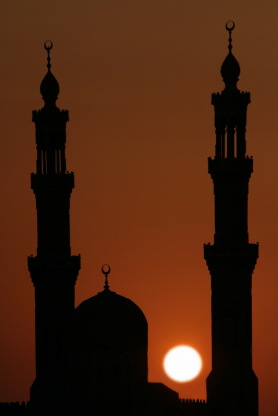
Cairo, March 16 (DPA – IANS) — Some 40 Muslim Brotherhood (MB) members including the deputy leader are awaiting trial before a military court. They were charged with “money laundering,” operating a “militia,” using “terrorist tactics” to serve their goals and being members of a “banned movement.” Military court verdicts cannot be appealed.
About 240 MB members have been detained, including leaders and senior members.
“The latest detentions represent a direct reaction against the MB’s stand, especially that its MPs have announced their withdrawal from the parliamentary sessions,” MB first deputy leader Mohamed Habib said.
In December 2006, Egyptian President Hosni Mubarak asked the legislature to amend 34 articles of the constitution as part of a political reform package – the first major change in the constitution since 1971.
The opposition and the MB specifically opposed an amendment cancelling the judicial monitoring of the voting process in elections, a second one that imposes conditions for nominating presidential candidates and a third banning the formation of political parties based on religious denomination – a restriction clearly aimed at preventing the MB from emerging as a political party.
The Egyptian leadership openly expressed concerns over the MB’s growing political power while adopting an Islamic cover.
Mubarak said in January that “the banned Muslim Brotherhood movement represents a danger to (state) security because it adopts a religious path.
“You stand here before many groups comprising the weave of Egyptian society and before different – and even conflicting – opinions about whether Egypt should be a civil or a religious state,” he said.
MB members believe they suffer most from “suppression.” “It is a dictatorial political system based on a single person repressing the opposition in general and the MB in particular,” Habib said.
Winning 88 seats in parliament, the MB has become the strongest bloc in parliament after the ruling National Democratic Party (NDP), which occupies 333 seats with its allies.
The MB’s gains in power have raised concerns about their real intention and their motto: “Islam is the solution.” The question is whether religion for them is just a means to a political end.
After the parliamentary elections in November and December 2005, Gamal Mubarak, the president’s son and an NDP leader, who it is believed may succeed his father in office, said the movement’s emergence was having “negative repercussions on the electoral and political process”.
The MB was founded in 1928 by Hassan al-Banna, a schoolteacher, to promote a social renewal based on an Islamic ethos of altruism and civic duty, in opposition to political and social injustice and to British imperial rule.
The organisation initially focused on educational and charitable work, but quickly grew to become a major political force as well, by championing the cause of the disenfranchised classes, playing a prominent role in the Egyptian nationalist movement and promoting a conception of Islam that attempted to restore broken links between tradition and modernity.
In the 1970s, a large student Islamic activist movement took shape independently from MB. In the 1980s, during Mubarak’s presidency, many of these activists joined the MB, enabling it to win a number of elections to the executive boards of prominent professional associations.
© 2007 IANS India Private Limited, New Delhi. Posted on Religioscope with permission. — Indo-Asian News Service (IANS) is India’s first multinational and multilingual wire service. Website: www.ians.in. Subscription enquiries: contact IANS (mention Religioscope).